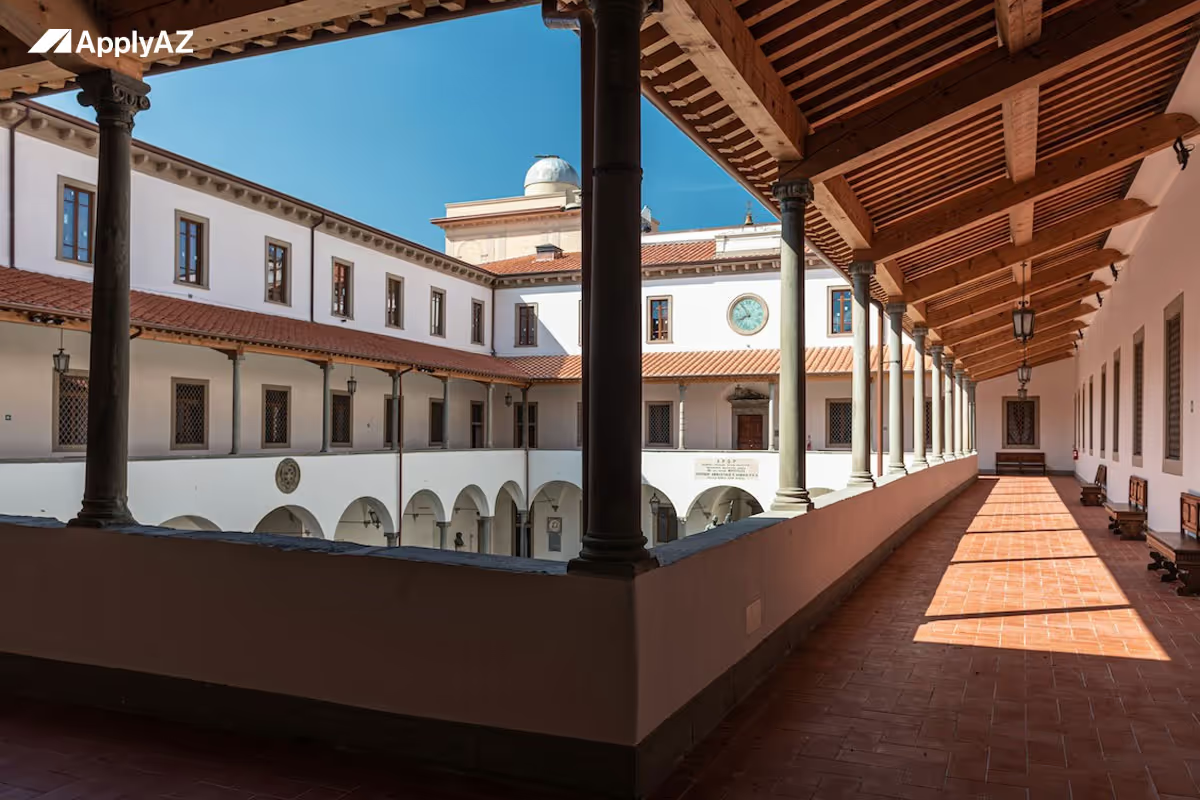Heading
Heading








Study in Italy in English at the University of Pisa (Università di Pisa)
Study in Italy in English at the University of Pisa. Learn about tuition-free universities Italy, scholarships, student life, and career options with ApplyAZ.
1. Why Choose the University of Pisa for English-Taught Programs in Italy
The University of Pisa (Università di Pisa) is one of the oldest public Italian universities, founded in 1343. It appears regularly among the world’s top 200 in subjects such as Engineering, Computer Science, Mathematics, Medicine, and Law. Famous thinkers like Galileo Galilei studied and taught here, helping to create a strong research tradition that still guides the campus today.
Key strengths
- Ranked highly in Agriculture, Physics, and Veterinary Medicine.
- More than 70 English-taught degree options across Bachelor’s, Master’s, and PhD levels.
- Modern laboratories in Computer Science, Aerospace Engineering, and Nanotechnology.
- Active member of the European University Alliance EELISA, which offers joint degrees and smooth credit transfers.
International students benefit from small class sizes, supportive professors, and weekly study workshops that explain the Italian exam style and grading system.
2. Living and Studying in Pisa: A Guide for International Students
Pisa is a compact city beside the River Arno, with about 90,000 residents and roughly 50,000 students. Everything centres on the university, so newcomers quickly feel at home.
Student life
- Cafés around mediaeval squares host “aperitivo” evenings: buy one drink, enjoy free snacks.
- The university sports centre runs rowing, football, yoga, and climbing at low cost.
- More than seventy student clubs organise hackathons, language swaps, and volunteer projects.
Affordability
- Typical monthly budget: €650–€750 for shared housing, food, transport, and leisure.
- University residences start at €240 per month, including utilities.
- Many local restaurants give 15 percent discounts to students who show their ID card.
Climate and transport
- Winters are mild (around 8 °C); summers reach 30 °C, perfect for outdoor study sessions.
- Pisa International Airport connects to eighty European cities; trains reach Florence in one hour.
- A €35 smartcard offers unlimited bus travel and free use of university bicycles.
Culture
The Leaning Tower, Romanesque churches, and riverside walks provide a stunning daily backdrop. Students enter most museums for €2 and can join free choir or theatre groups. In June, the Luminara di San Ranieri festival lights the city with 100,000 candles—an unforgettable sight.
3. Tuition-Free Universities Italy: How the University of Pisa Keeps Costs Low
By national law, tuition at public universities depends on family income and country of origin. If household income is below €24,000, fees drop to zero, placing Pisa firmly among tuition-free universities Italy. Even at the highest bracket, tuition seldom passes €2,400 per year.
Funding options
- DSU grant (regional scholarship) that covers housing, meals, and a €2,000 yearly allowance.
- University merit awards of €7,200 for the top three students in each faculty.
- Invest Your Talent in Italy fund, which gives a full fee waiver plus an internship at a partner company.
4. Career Paths and Internship Networks in Pisa
Pisa sits at the centre of Tuscany’s growing tech and life-science scene. The city hosts more than 350 internship agreements through the university’s Technology Transfer Office. Below are the main sectors and how they match different study fields:
- Aerospace and robotics – Companies such as Leonardo, Thales Alenia Space, and Piaggio Aerospace recruit design engineers, AI analysts, and project managers.
- ICT and cybersecurity – Firms like Cisco DevNet, Aruba Cloud, and several National Research Council labs need software developers, data scientists, and security testers.
- Life sciences – Istituto di Fisiologia Clinica, PharmaNutra, and Abbott offer lab research, clinical data, and quality-control roles.
- Agritech and food innovation – Enel Green Power, Irritec, and the Tuscany Wine Consortium look for agronomists, logistics planners, and sustainability officers.
Innovation hubs
- Polo Tecnologico di Navacchio houses around seventy start-ups in fintech, virtual reality, and clean tech, with weekly English-language mentoring sessions.
- The Sant’Anna–Pisa Innovation Centre runs joint biomedical projects with institutes such as MIT and Oxford, open to Master’s candidates.
- Branches of the National Research Council (CNR) in Pisa focus on AI ethics and sustainable chemistry and accept Erasmus interns each year.
Students may work part-time up to twenty hours a week, typically earning €600–€800 monthly—enough to cover rent and social activities. After graduation, a one-year “job-search visa” lets you stay in Italy while moving into full-time employment.
5. Next Steps: Start Your Journey
Pisa blends academic prestige, a friendly Mediterranean lifestyle, and direct links to high-tech and creative industries. When you study in Italy in English at the University of Pisa, you pay little or nothing and gain hands-on experience that launches your career. Imagine cycling past the Leaning Tower after a robotics lab or sipping espresso during a coding break—this can be your everyday life.
In two minutes we’ll confirm whether you meet the basic entry rules for tuition-free, English-taught degrees in Italy. We’ll then quickly see if we still have space for you this month. If so, you’ll get a personalised offer. Accept it, and our experts hand-craft a shortlist of majors that fit your grades, goals, and career plans. Upload your documents once; we submit every university and scholarship application, line up multiple admission letters, and guide you through the visa process—backed by our admission-and-scholarship guarantee.
Study in Italy in English with the Studies in Performing Arts and Communication Course at the University of Pisa (Università di Pisa)
Explore the Studies in Performing Arts and Communication at the University of Pisa. Study in Italy in English, enjoy tuition-free options, and get ApplyAZ support.
1. Welcome to an English-Taught Program in Italy
English-taught programs in Italy let you earn a respected degree while living in a country famous for art, music, and culture. The Studies in Performing Arts and Communication course at the University of Pisa (Università di Pisa) is part of this growing trend. It teaches you how theatre, cinema, digital media, and live events shape modern society. Because the course sits in one of the oldest public Italian universities, you join a tradition that dates back to 1343. Yet the modules stay fresh, mixing classic texts with new technologies.
In the first weeks you meet classmates from Europe, Asia, Africa, and the Americas. You all share the same goal: study in Italy in English and build careers in film, television, journalism, cultural management, or interactive media. Lecturers speak clear English, and language tutors help you tackle Italian texts when needed. With ApplyAZ guiding your paperwork, you focus on classes, rehearsals, and studio projects instead of visa forms.
2. Course Overview: Studies in Performing Arts and Communication
2.1 Degree Structure
The course belongs to class L-3 (Visual Arts, Music, Performing Arts, Fashion) and L-20 (Communication Sciences). It follows a three-year bachelor pathway worth 180 ECTS credits (European Credit Transfer and Accumulation System). You take both theoretical and practical subjects, including:
- History of Theatre and Performance
- Film Analysis and Screenwriting
- Media Sociology and Audience Studies
- Digital Storytelling and Interactive Narratives
- Stage Direction and Scenography (stage design)
- Public Speaking and Event Management
- Cross-Cultural Communication
Elective workshops change each semester, covering podcast production, motion capture, virtual reality stages, and social-media strategy. You can also choose Italian-language modules once your skills improve. Group projects encourage you to mix talents: one student directs, another designs sets, a third manages marketing. The result may be a short film, an art installation, or a live streamed concert in the historic Teatro Verdi.
2.2 Learning Goals
By the end you will:
- Analyse performances, films, and digital media with critical rigour.
- Produce creative work that respects cultural heritage and embraces innovation.
- Communicate ideas clearly to academic and public audiences.
- Manage cultural events from planning to promotion.
- Collaborate across disciplines and languages.
These skills match global demand for content creators, cultural planners, and media strategists.
3. Why Choose the University of Pisa for Performing Arts and Communication
3.1 Academic Reputation
The University of Pisa ranks among the top 200 world universities in Arts and Humanities (QS subject tables, 2024). Its Department of Civilisations and Forms of Knowledge leads research on performance theory, media archaeology, and audience engagement. Visiting professors from London, Paris, New York, and Seoul give masterclasses every term.
3.2 Facilities
- A modern media lab with 4K cameras, sound studios, and green-screen sets.
- The Multimedia Library, holding 10,000 DVDs, scripts, and digital journals.
- Access to Pisa’s Centro per l’Arte Contemporanea and Opera del Duomo archives.
- Rehearsal rooms with lighting rigs and motion-tracking software.
3.3 Living Culture
Pisa hosts film festivals, open-air theatre, fringe dance shows, and experimental music nights. Student tickets cost €5–€8. Street artists turn narrow lanes into live galleries. Cultural life runs all year thanks to mild winters and warm summers. You learn beyond the classroom, observing how audiences react in real time.
4. Career Paths and Industry Links
4.1 Internships
The department partners with:
- RAI Toscana (regional branch of Italy’s national broadcaster)
- Palazzo Blu Cultural Centre (exhibitions and events)
- Pisa Book Festival (international book fair)
- Crossmedia Group, Florence (multimedia shows)
- Teatro Verdi and Teatro Rossini (main theatre houses)
You can intern for 150–300 hours, earning course credit and contacts. Projects include subtitling art-house films, curating social-media campaigns, or assisting directors backstage.
4.2 Typical Jobs
Graduates move into roles such as:
- Cultural event coordinator
- Theatre producer
- Film festival programmer
- Multimedia journalist
- Social-media strategist
- Museum educator
- Digital content creator
Multilingual graduates who study in Italy in English have an edge when pitching to international venues or streaming platforms.
4.3 Further Study
Many alumni stay in Italy for Master’s degrees in Cinema Studies or Digital Humanities. Others secure places in European joint programmes under Erasmus Mundus. The course lays a strong base for research careers in performance or communication science.
5. Tuition-Free Universities Italy: Costs and Funding
Public Italian universities set tuition based on family income and nationality. If household income stays under €24,000, your fees at the University of Pisa drop to zero. Even higher brackets rarely exceed €2,400 per year.
5.1 Scholarships and Grants
- DSU grant: Covers meals, housing, and a yearly allowance of about €2,000. Awarded by the Tuscan Regional Authority.
- Ministry Merit Scholarship: Up to €7,200 for top 2 % of students.
- Orchestra Scholars Fund: Support for students leading music-based projects.
6. Life in Pisa: A Student-Friendly City
6.1 Affordable Living
Rent for a shared flat ranges from €250 to €350 per month. Food costs about €200. A €35 travel card gives unlimited bus rides and free access to public bikes. Weekend trains reach Florence in one hour, Rome in two, and the beach in fifteen minutes.
6.2 Community
Half the city’s population are students. You walk everywhere or cycle along the River Arno. Cafés serve budget pasta and panini deals. Markets sell fresh produce daily. Local families often rent spare rooms to international students and offer language exchange.
6.3 Safety and Support
Pisa scores high on student safety leagues. Night buses run until 2 am. The university offers free counselling and a buddy scheme pairing newcomers with senior peers. English-speaking doctors staff the university health centre.
Ready for this programme?
If you qualify and we still have a spot this month, we’ll reserve your place with ApplyAZ. Our team will tailor a set of best-fit majors—including this course—and handle every form and deadline for you. One upload, many applications, guaranteed offers, DSU grant support, and visa coaching: that’s the ApplyAZ promise. Start now and secure your spot before this month’s intake fills up.

They Began right where you are










